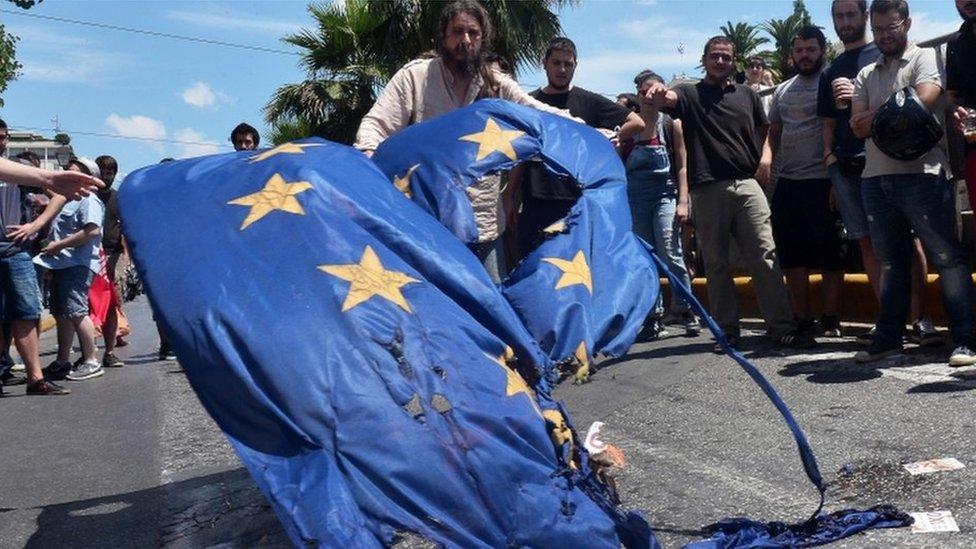Greece debt crisis: Splits threaten Syriza coalition
- Published
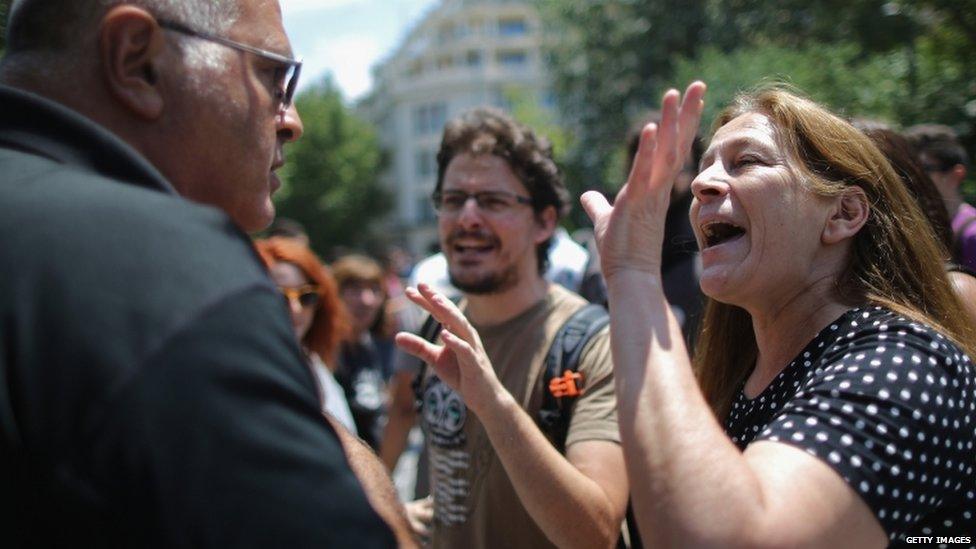
Passions are heating up ahead of Sunday's vote in Greece
Greek MPs from the two governing parties have returned to their constituencies to persuade voters to back a "No" in Sunday's referendum, and the result is likely to decide their future in government.
Publicly, the radical left Syriza party is maintaining a unified stance on voting "No" to the terms of the eurozone bailout. But deepening splits have been showing for weeks over the debt talks with international creditors and that unity is unlikely to continue after the vote.
Already, dissent has emerged among the Independent Greeks, a nationalist party whose 13 MPs help give Syriza a majority. Several want the referendum to be called off and one, Costas Damavolitis, publicly backs a "Yes" vote.
Syriza came to power in January with 149 MPs, only two seats short of a majority, but factions within the party are pulling Prime Minister Alexis Tsipras in different ways.
So which are the factions and what do they want?

Hardcore left 'platform'
Between 30 and 40 MPs, seen as hardline leftists, do not want a deal with the eurozone at any cost and it is thought Mr Tsipras called the referendum because he could not have secured their backing in parliament for a deal.
Most are in favour of a return to the drachma, although they refrain from saying it openly.
Costas Lapavitsas, a UK economist and Syriza MP, has long campaigned for a return to the drachma, blaming the bank closures on the European Central Bank's decision not to extend its cash assistance to the banks. But he accepts the party's policy is for change within the euro.
Greece's divided government - Explained in a minute
"He's known as the drachma professor," says political correspondent Christos Michaelides of Greek website Protagon. "But every time he goes on TV the 'Yes' vote climbs."
Another MP, Stathis Leoutsakos, believes the government should already start preparing to print drachmas, arguing that money is merely made of paper.
A key figure in this hardline group is Energy Minister Panagiotis Lafazanis, who believes a "strong 'No' from the Greek people on Sunday will be above all a big 'Yes' to an independent and sovereign Greece". He is seen as commanding the support of at least 15 MPs.
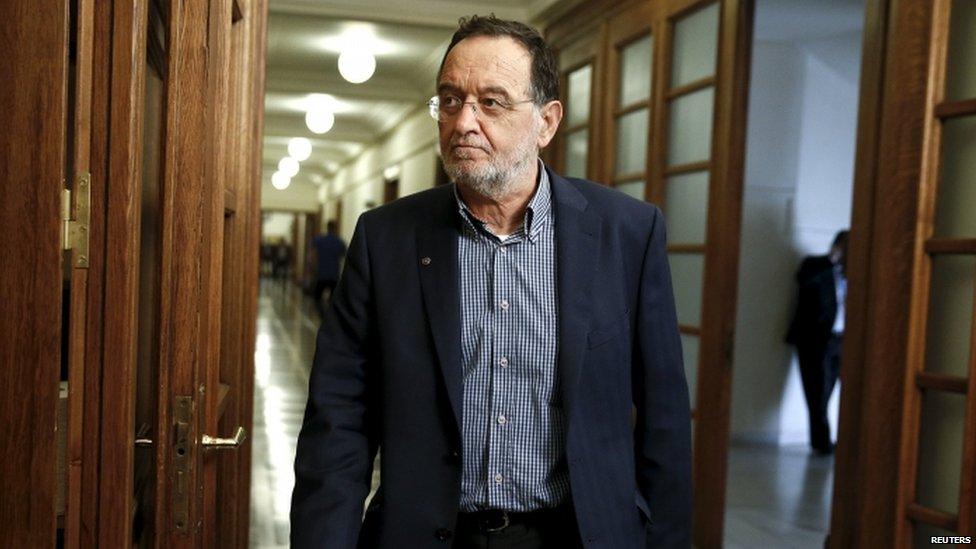
The energy minister commands considerable support on the left of the party
Syriza emerged from a communist past and has several MPs who still see themselves as revolutionary Marxists or Maoists.

Moderates
Much of the debt negotiation with the EU has been carried out by Western-educated ministers who are strongly in favour of remaining in the eurozone.
Greek deputy foreign minister Euclid Tsakalotos spoke to the BBC's Katya Adler.
Deputy Prime Minister Yannis Dragasakis and deputy Foreign Minister Euclid Tsakalotos are seen as particularly moderate and are thought to have had significant reservations about the decision to call a referendum.
To these can be added Parliament Vice-President Alexis Mitropoulos, who says he does not want the responsibility of leading Greece out of the eurozone. And then there are MEPs Stelios Kouloglou and Kostas Chrysogonus, who are seen as dissidents within the party.
Another small group of MPs within the moderate camp were originally on the left of Socialist party Pasok, but defected and now find themselves on the right of Syriza, says Christos Michaelides. "These are mainly unionists who had jobs in public services. These are not embedded in the Syriza philosophy."
However, there is no suggestion that they will defy the party line in favour of a No vote.

Alexis Tsipras and his entourage
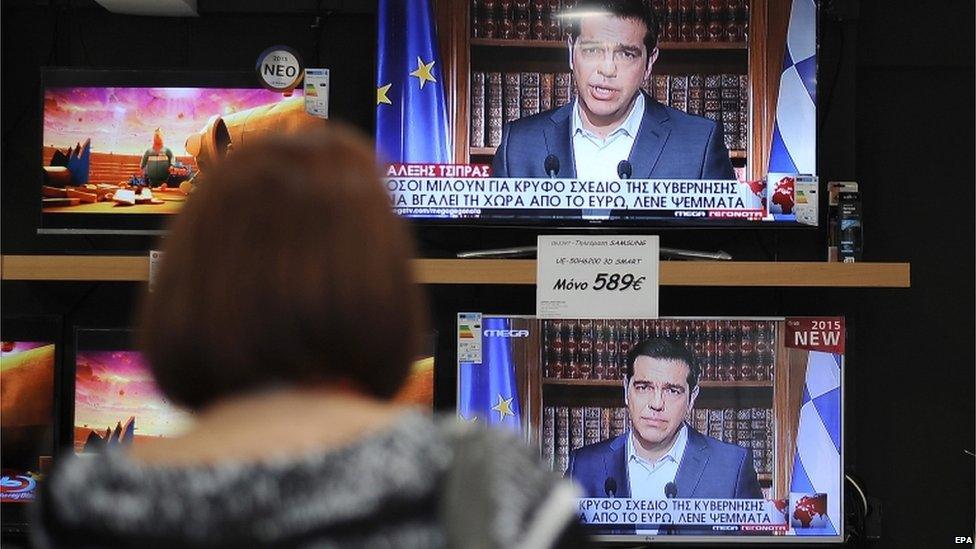
At the heart of the party are the prime minister himself and his closest confidants, State Minister Alekos Flambouraris and State Minister Nikos Pappas. Within this group can be included a good number of loyalist MPs, who will stick to the party leader regardless of the result.
Nevertheless, Mr Tsipras's position will largely be decided by Sunday's referendum.
Nikos Pappas: "All sides know an agreement is crucial"
"Tsipras is caught between different tendencies," says Othon Anastasakis, director of the European studies centre at Oxford University.
If he secures a "No" vote, he argues he will be in a far better position to reach a debt deal with the eurozone.
But a "Yes" result would almost certainly bring him and his party down.

Yanis Varoufakis
Yannis Varoufakis says he wants a deal with creditors after the result of the referendum has been decided
Greece's charismatic finance minister was sidelined for some time after eurozone negotiations collapsed in May.
"He has been a loose cannon and nobody knows at what times he has influenced Alexis Tsipras. He was sidelined but over the last three weeks he has become very dominant again and Tsipras has given him more liberty to act," says Othon Anastasakis.
He has vowed to resign in the wake of a "Yes" vote. But, like Mr Tsipras and his entourage, he sees a speedy deal with the eurozone after a "No" vote as inevitable.

- Published20 July 2015
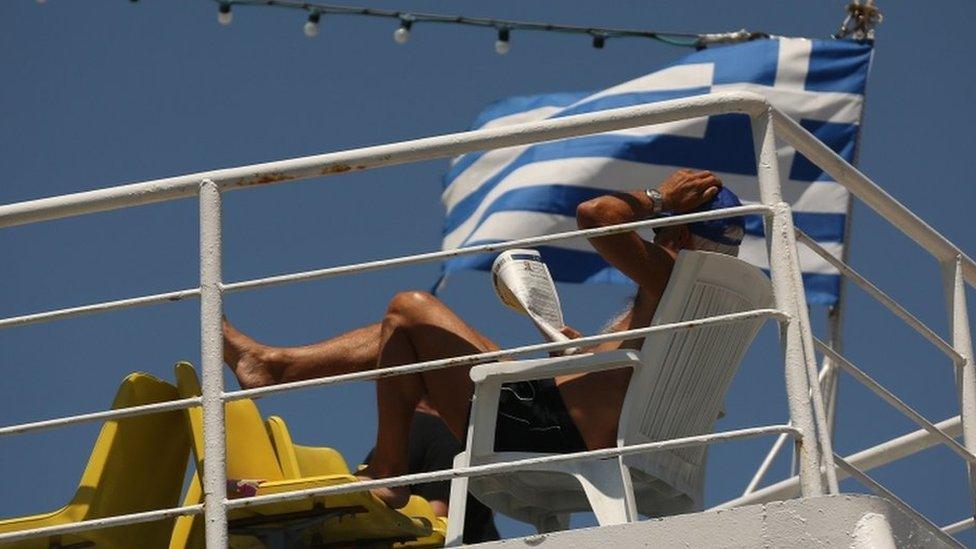
- Published2 July 2015
